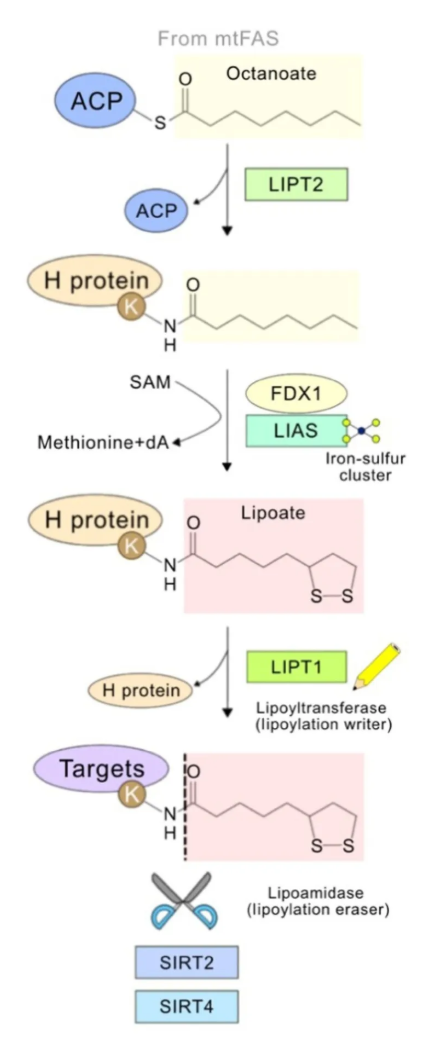Lipoylation Analysis Service
Lipoylation is a specialized post-translational modification in which the lipoic acid cofactor is covalently attached to specific lysine residues of mitochondrial enzymes. This modification is essential for maintaining the activity of several multienzyme complexes that are central to energy metabolism. MtoZ Biolabs offers a specialized Lipoylation Analysis Service that integrates state-of-the-art instrumentation with advanced proteomics strategies, catering to both targeted and global research needs.
1. Target Protein Lipoylation Analysis
This service focuses on the systematic profiling of lipoylation on a specific protein of interest. Our workflow combines chemical enrichment with high-resolution mass spectrometry to detect lipoylation mediated through thioester or amide linkages. Complementary techniques such as SDS-PAGE separation and antibody-based validation ensure robust and reliable results. This targeted approach allows precise characterization of lipoylation status, supporting mechanistic studies, functional validation, and translational research focused on individual proteins.
2. Lipoylation Proteomics
For studies at the systems level, our Lipoylation Proteomics service enables global profiling of lipoylation across the proteome. We integrate advanced enrichment strategies with high-resolution LC-MS/MS acquisition to identify lipoylated proteins, map modification sites, and quantify dynamic changes under varying biological conditions. Comprehensive bioinformatics analysis links lipoylated proteins to functional pathways, metabolic processes, and disease associations, providing insights into regulatory networks and potential therapeutic targets in mitochondrial metabolism and disease pathogenesis.
What Is Lipoylation?
Lipoylation is a rare but vital modification. It involves the covalent attachment of lipoic acid, an eight-carbon fatty acid containing disulfide groups, to lysine residues within the active centers of enzyme complexes. This modification is critical for oxidative decarboxylation reactions, as lipoylated proteins serve as catalytic cofactors in mitochondrial dehydrogenase complexes such as pyruvate dehydrogenase, α-ketoglutarate dehydrogenase, and branched-chain α-keto acid dehydrogenase.
The process of protein lipoylation requires a specialized metabolic pathway. Endogenous lipoic acid is synthesized in mitochondria through the action of lipoic acid synthase, which introduces sulfur atoms into an octanoyl-acyl carrier protein intermediate. The lipoyl moiety is then transferred onto lysine residues of target proteins via lipoate-protein ligase (LplA) or lipoyl transferases. The reversible redox nature of the lipoic acid group allows it to participate in electron transfer reactions, making lipoylation indispensable for energy production and metabolic flexibility.

Lin, C H. et al. Trends in Biochemical Science, 2024.
Figure 1. The General Pathway of Protein Lipoylation
Abnormal regulation of lipoylation has been linked to inherited metabolic disorders, neurodegenerative diseases, cancer, and immune dysfunction. In addition, lipoylation is increasingly recognized as part of the broader landscape of acyl-lysine modifications, intersecting with acetylation and succinylation to influence metabolic adaptation. With advances in mass spectrometry-based proteomics, large-scale profiling of lipoylation is now feasible, enabling researchers to uncover its diverse biological roles.
Analysis Workflow

Sample Submission Suggestions
1. Sample Types
We accept various biological sample types, including but not limited to:
-
Cultured cells
-
Microorganism samples
-
Animal or human tissue
-
Plant tissue
-
Biological fluids such as plasma or serum
-
Protein extracts
2. Storage and Transport
-
Samples should be snap-frozen in liquid nitrogen and stored at –80°C until shipment.
-
Ship samples on dry ice.
-
Avoid repeated freeze–thaw cycles.
*Note: If you have special sample types or require additional guidance, please contact us for personalized support before sample preparation.
Service Advantages
✔️Advanced Analytical Platform
An advanced Lipoylation Analysis Service platform ensures precise identification and quantification of lipoylation events.
✔️Experienced Team
Extensive experience in acylation studies allows us to deliver accurate and biologically meaningful results.
✔️Comprehensive Bioinformatics Support
Integration of pathway and network analysis highlights the functional significance of lipoylation.
✔️Customized Solutions
Services can be adapted for global profiling or targeted validation, depending on research needs.
✔️Reliable and Reproducible Data
Strict quality control guarantees consistency and publication-ready deliverables.
Applications
The Lipoylation Analysis Service at MtoZ Biolabs supports diverse applications in life science research:
1. Mitochondrial Function Studies
Elucidating how lipoylation regulates the activity of mitochondrial dehydrogenase complexes.
2. Metabolic Regulation
Linking lipoylation status to central carbon metabolism, fatty acid oxidation, and energy homeostasis.
3. Disease Mechanism Research
Investigating dysregulated lipoylation in inherited metabolic syndromes, cancer, and neurodegenerative diseases.
4. Biomarker Discovery
Identifying lipoylation signatures as potential biomarkers for diagnostics and therapeutic monitoring.
5. Drug Development
Assessing lipoylation as a target for pharmacological modulation in metabolic and mitochondrial diseases.
Deliverables
1. Comprehensive Experimental Details
2. Materials, Instruments, and Methods
3. The Detailed Information of Lipoylation Analysis
4. Mass Spectrometry Image
5. Bioinformatics Analysis
6. Raw Data
The Lipoylation Analysis Service at MtoZ Biolabs offers comprehensive solutions, from experimental design to functional interpretation, ensuring that researchers gain actionable insights into this important modification. Contact us to explore tailored solutions for your research.







